The online education market has exploded in recent years, creating lucrative opportunities for entrepreneurs, bloggers, and content creators to develop and sell online courses.
This is how we have earned most of our money blogging on our website. We’ve been able to earn over $70,000/month with course sales alone over the years, and it has allowed us to build an incredible community and audience for our business.
But choosing the right online course platform is important because you don’t want your success to stall out because of a lack of customizability or features included with your platform.
We’ve experimented with a number of course platforms over the years, and we’ve created this comprehensive guide to cover the top platforms for course creators.
We’ll cover key features, pros and cons, pricing, and more to help you select the ideal solution for creating engaging courses, building an audience, and generating revenue through an online learning platform.
Whether you’re a seasoned expert or just starting out, this article provides valuable insights into the top course creation tools, empowering you to share your knowledge effectively in today’s booming online learning landscape.
Here is a summary of our top picks for online course platforms:
- Best for simplicity and just starting out: Teachable or Podia
- Best for additional marketing tools: Kajabi or Kartra
- Best for online communities: Mighty Networks
- Best course marketplaces: Skillshare and Udemy
- Best for gamification: LearnWorlds or Xperiencify
- Best for LMS platforms: LearnDash or iSpring Learn
The Course Creation Industry is Growing
The digitalization of education has led to an expanding market for online courses, fueled by advancements in technology and changing educational needs.
The convenience of learning anytime and anywhere has made online courses popular among students and professionals alike.
The online learning industry has demonstrated remarkable growth and is projected to continue expanding significantly. By 2026, the e-learning market size is expected to grow by about 66% compared to 2019, reaching an estimated $167.5 billion.
Specific segments like mobile e-learning and virtual classrooms are experiencing even higher growth rates, with increases of 149% and 191% respectively.
This growth is largely driven by the increasing acceptance and integration of digital learning tools in both the academic and corporate sectors.
Academic Sector Growth
In the academic realm, nearly all educational institutions now incorporate some form of e-learning. The market for academic e-learning alone is expected to grow at an annual rate of 17.7%, reaching approximately $855 billion by 2030.
This expansion is fueled by the cost-effectiveness of digital course delivery and its capability to extend educational opportunities globally.
Corporate Sector Growth
The corporate e-learning market also shows robust expansion, with a projected growth rate of over 20% annually, potentially reaching around $450 billion by 2028 (Sell Courses Online).
This surge is attributed to businesses increasingly adopting online training methods to enhance employee skills and reduce training costs.
Key Statistics
Here are some interesting statistics about the online course industry:
- The global online education market is expected to reach $325 billion by 2025, growing at a CAGR of 7.5% during the forecast period (2020-2025) according to a report by MarketsandMarkets.
- In the corporate sector, it’s predicted that by 2025, over 80% of the workforce will require technology skills, leading to the rise of online professional development courses.
- Online courses are the most popular product type in the creator economy, with 55% of creators wanting to sell online courses.
Here are some additional statistics about course creation itself:
- Over half of course creators spend 3 months or longer creating a course, according to a study by Course Method.
- On average, an online course costs $137, based on a study by Podia involving over 130,000 course sales.
- Teachable content creators earning 6 figures increased by 38% in 2021, and those generating 7-figure revenue went up by 48%.
This surge in demand has prompted educators and entrepreneurs to seek out online course platforms that enable them to create, market, and sell their courses effectively.
What is an Online Course Platform?
An online course platform, also known as a course creation platform or a learning management system (LMS), is a specialized type of software that allows individuals or organizations to create, host, deliver, and manage educational courses on the Internet.
These platforms provide a comprehensive suite of tools and features for building course websites, creating content, interacting with students, tracking progress, and handling transactions.
While specific features may vary across platforms, most online course creation platforms offer the following core functionalities:
- Course authoring tools for creating multimedia content (videos, audio, text, quizzes, etc.)
- Student enrollment and management tools
- Progress tracking and reporting
- Gamification and engagement features (badges, certificates, discussion forums, etc.)
- Payment integrations
- Marketing features (email campaigns, sales and landing pages, etc.)
- Mobile responsiveness and accessibility
- Customization and integration with other marketing and business tools
Before deciding which online course creation platform is best for you, consider the features that you might want or use when you create your online course.
Types of Course Creation Platforms
When choosing a platform for creating and delivering online courses, it’s crucial to understand the two main types available, each catering to different needs and goals of course creators:
All-in-One Course Platforms
These platforms are designed to provide everything a course creator needs to build, market, and sell online courses. They are particularly popular among independent educators and small businesses that want a comprehensive solution without the need for extensive technical expertise.
All-in-one course platforms typically include tools for course creation, website building, student registration, payment processing, and marketing.
Kajabi and Teachable are two prominent examples in this category, offering built-in tools for email marketing and sales funnels, which help creators automate much of the marketing and sales process.
Learning Management Systems (LMS)
LMS platforms are more focused on the educational delivery and management aspect of online courses. They are ideal for educational institutions and larger organizations that need robust functionalities to manage multiple courses and large numbers of students.
LMS platforms often provide detailed analytics, grade books, and integration with other educational tools, making them suitable for more formalized education settings.
Examples include Moodle and Blackboard, which offer extensive customization options and can handle complex learning scenarios like compliance training and certification programs.
Both types of platforms come with their own set of features designed to cater to the specific needs of different users:
- User Experience: All-in-one online course platforms often prioritize ease of use and simplicity in design, making them more accessible to non-technical users. In contrast, LMS platforms might offer more complex features that require a steeper learning curve but provide greater flexibility and control over the learning environment.
- Integration and Scalability: LMS platforms generally offer better options for integration with existing systems in educational institutions or large businesses and are designed to scale with the growth of the organization. On the other hand, all-in-one platforms might limit integration capabilities but excel in out-of-the-box functionality.
- Customization: While all-in-one course platforms provide sufficient customization for branding and basic course structure, LMS platforms typically allow deeper customization options to meet specific educational needs and adhere to institutional policies.
Understanding these distinctions helps potential course creators select the best platform based on their specific requirements, whether they are looking to sell courses directly to consumers or provide structured learning environments for schools or businesses.
Each type offers unique benefits, and the choice depends largely on the creator’s goals, audience, and technical proficiency.
17 Best Online Course Platforms
Here’s a detailed look at the top course creation platforms on the market.
1. Kajabi
- Best for: Course creators looking for an all-in-one solution with integrated marketing tools to help sell more courses

Kajabi is a powerful all-in-one course platform that provides a comprehensive suite of tools for creating, marketing, and selling online courses.
It’s also our #1 pick because it’s what we use to sell our courses. We sold our courses on Teachable for years, but we eventually felt like it was past time for an upgrade.
While Teachable is a solid #2 choice on our list, we find the sales pages and course design features greatly lacking compared to Kajabi and some others.
With its intuitive course builder, you can easily develop multimedia content, including videos, quizzes, and downloadable resources.
Kajabi also offers robust marketing features, such as email automation, sales funnels, and landing pages, to help promote and sell courses effectively. We ultimately chose it for its great community features.
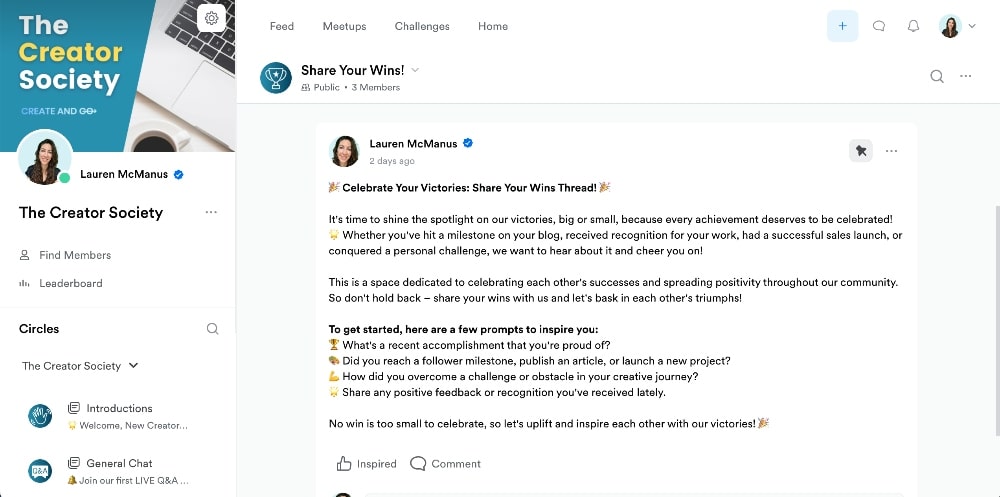
Key Features:
- Drag-and-drop course builder
- Customizable website and landing pages
- Email marketing and automation
- Sales pipelines and funnels
- Membership sites
- Community groups
- Affiliate program for courses
- Analytics and reporting
- Great customer support
- Mobile app
Our Opinion
Kajabi is the best all-in-one online course platform on this list because of its extensive set of features. With landing pages and full email marketing automation, Kajabi allows you to cut costs for additional software like LeadPages, Kit, etc.
Pricing
You can also get started with a free 14-day trial.
- Basic Plan: Starting at $119/month for up to 3 products and funnels
- Growth Plan: Starting at $159/month for up to 15 products and funnels
- Pro Plan: Starting at $319/month for up to 100 products and funnels
2. Teachable
- Best for: Beginners and solo educators due to its user-friendly interface and straightforward course-building tools
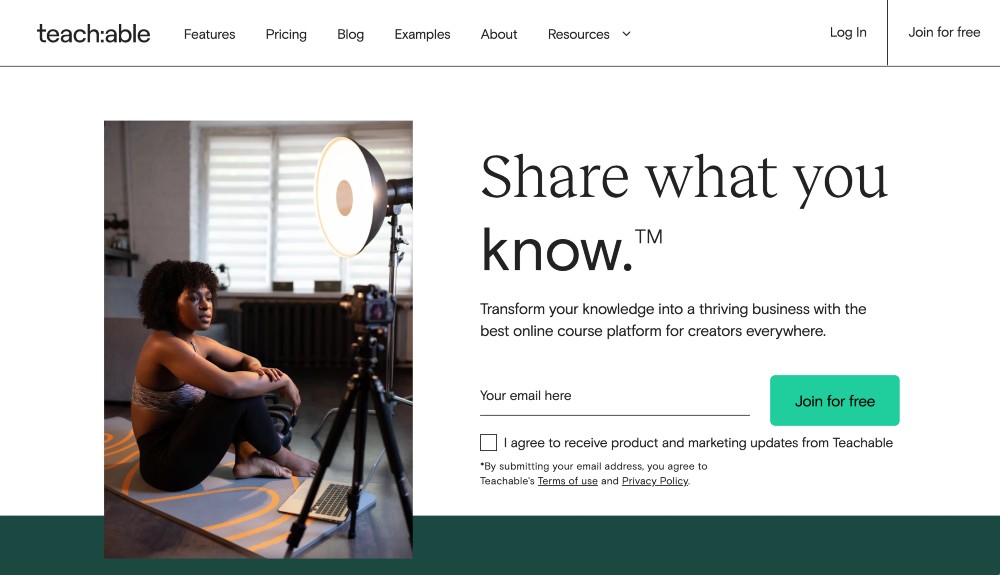
Teachable is one of the most popular online course platforms on the market because of its simplicity and ease of use.
It offers a straightforward course creation process, making it an excellent choice for beginners and solo educators.
Teachable provides a range of customization options, allowing creators to brand their courses and websites with their own logos and color schemes.
They’ve also introduced a community feature that will allow you to create an online community with your course too.
We used Teachable for years and only upgraded to Kajabi as our needs evolved towards more integrated marketing features and advanced customization.
Key Features
- Fairly customizable course builder
- Customizable course pages and website
- Student engagement tools (comments, discussions)
- Integrated payment processing
- Sales and marketing tools (coupons, affiliates)
- Create a community for your courses
- Create and sell coaching products
- Analytics and reporting
- Great customer support
- Mobile app
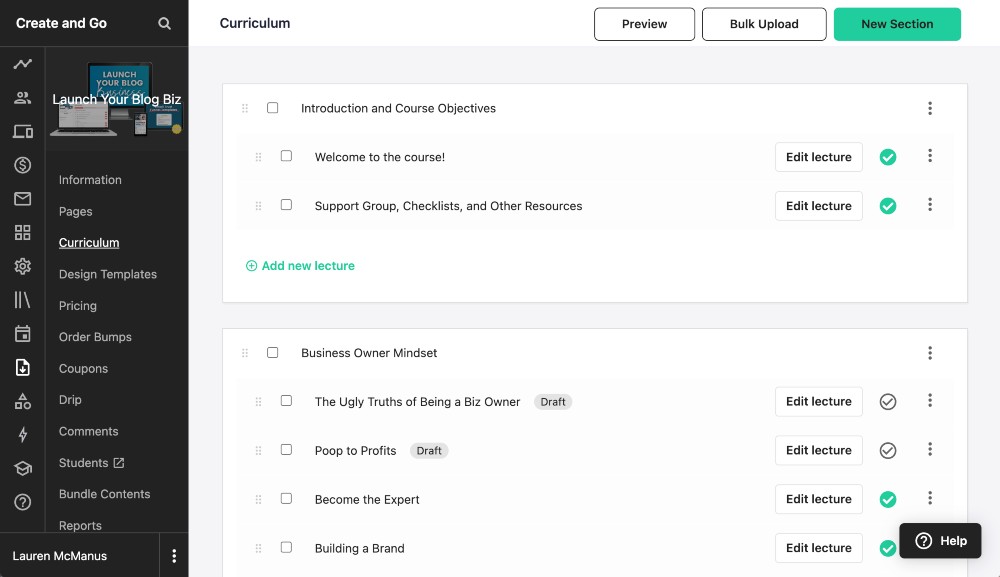
Our Opinion
While Teachable does not offer as robust a suite of marketing tools as Kajabi, it is an excellent online course software for those just starting out or for creators who prefer simplicity and ease of use. It allows for seamless course creation and basic marketing without the need for additional software.
Pricing
- Free Plan: $0/month with $1 + 10% transaction fees
- Basic Plan: Starting at $39/month with 5% transaction fees and up to 5 published products
- Pro Plan: Starting at $119/month with 0% transaction fees and up to 50 published products
- Pro+ Plan: Starting at $199/month for up to 200 published products
3. Thinkific
- Best for: Beginners and solo educators due to its user-friendly interface and straightforward course-building tools

Thinkific is a versatile online course software that offers a wide range of features and customization options.
It excels in supporting multimedia content, allowing creators to seamlessly incorporate videos, audio, PDFs, and other file types into their courses.
Thinkific also provides robust tools for student engagement, such as discussion forums and quizzes.
Key Features
- Multimedia course creation tools
- Customizable course player and website
- Student engagement tools (discussions, quizzes)
- Create online communities
- Integrated payment processing
- Marketing features and tools (coupons, affiliates)
- Analytics and reporting
- Mobile app
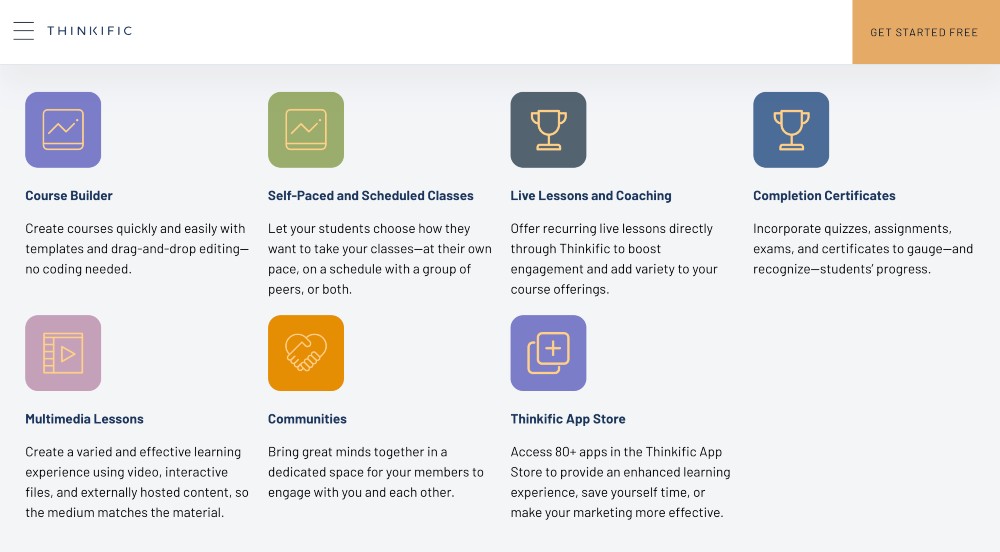
Our Opinion
To be honest, Thinkific is VERY comparable to Teachable in terms of features and customization. The only reason you might want to consider Teachable is that they also allow you to sell coaching products.
Pricing
- Free Plan: $0/month for limited features and 1 course
- Basic Plan: Starting at $36/month for custom domains, affiliate program, and more
- Start Plan: Starting at $74/month for assignments, bundles, memberships, and more
- Grow Plan: Starting at $149/month for additional reporting and bulk imports
4. Podia
- Best for: Creators who also want to sell memberships and digital products alongside their courses
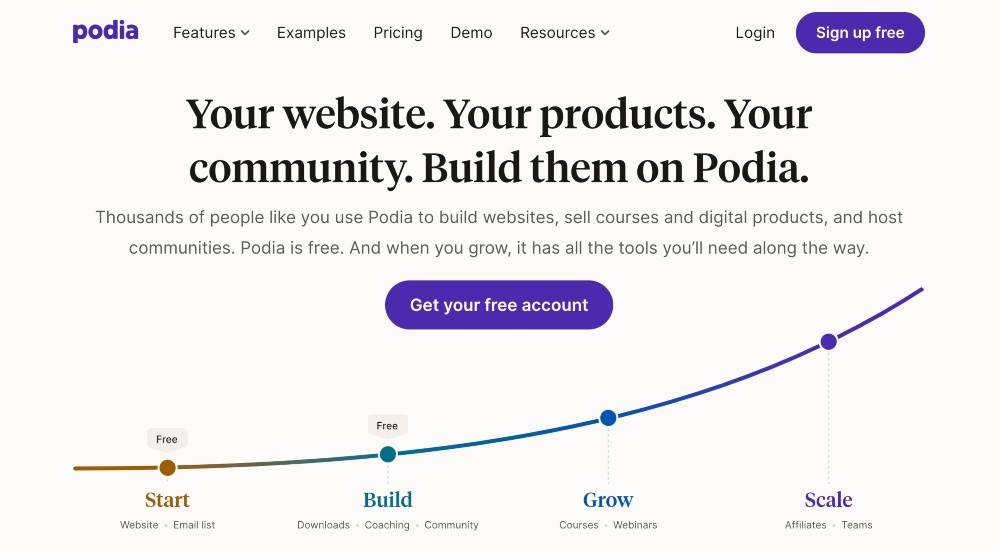
Podia is a versatile platform that allows creators to sell not only online courses but also digital products, such as ebooks and software, as well as membership subscriptions.
It offers a user-friendly interface and a range of tools for creating and delivering engaging content, including videos, quizzes, and downloadable resources.
Key Features
- Course creation tools
- Digital product sales (ebooks, software, etc.)
- Membership site capabilities
- Email marketing and messaging
- Customizable storefront and website
- Analytics and reporting
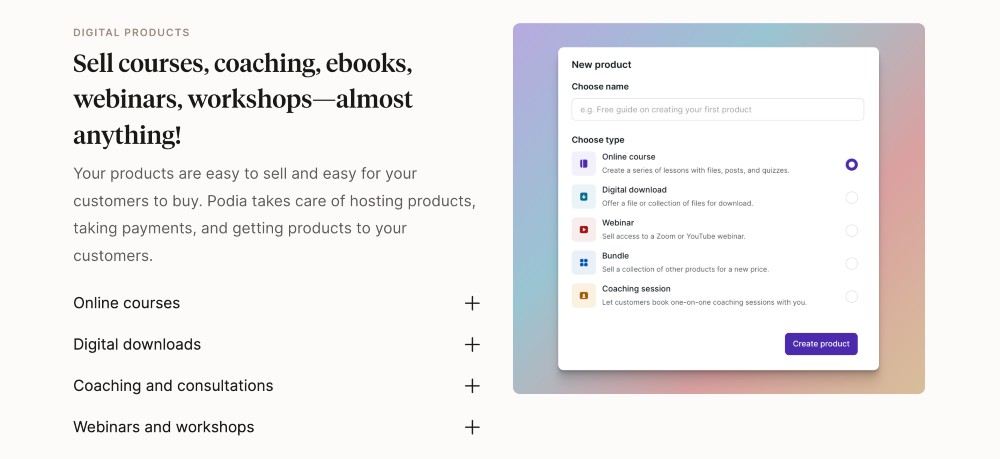
Our Opinion
While Podia doesn’t have a free plan, they are one of the more budget-friendly online course platforms. This is an ideal option for anyone wanting a wide range of features, including email marketing, but at a lower price.
One thing we don’t love about Podia is that they don’t support sales tax calculation and remittance, while Teachable does.
Pricing
- Free Plan: With 10% transaction fees
- Starter Plan: Starting at $4/month; Includes custom domain and 8% transaction fees
- Mover Plan: Starting at $33/month for 5% transaction fees
- Shaker Plan: Starting at $59/month for no transaction fees + unlimited courses
- Earthquaker Plan: Starting at $199/month
5. Mighty Networks
- Best for: Creators focused on building a community around their courses, allowing for deeper engagement
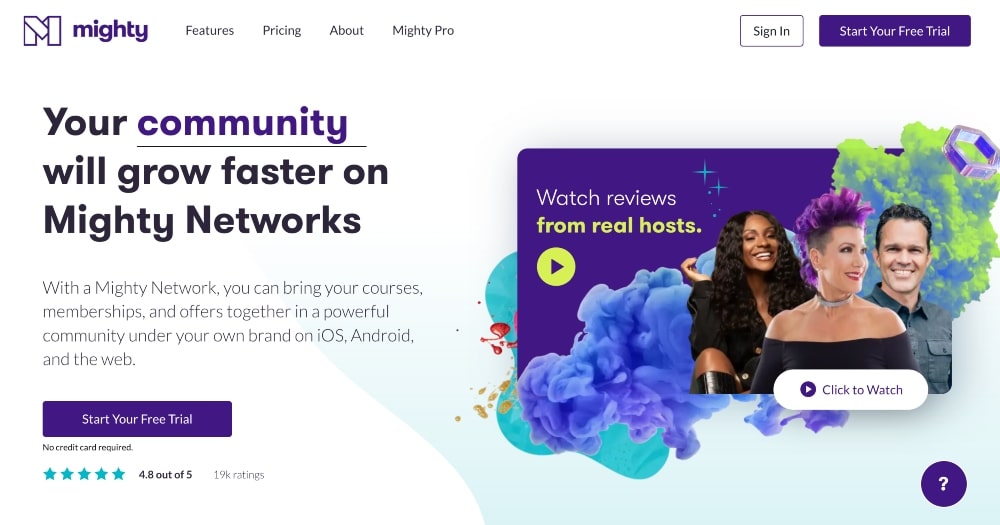
Mighty Networks is a unique platform that combines online course creation with community-building features.
In fact, #1 on our list of online community platforms.
Mighty Networks allows creators to not only develop and sell courses but also to foster a vibrant community around their content.
It offers robust engagement tools, such as discussion forums, live streaming, and direct messaging, enabling deeper connections between instructors and students.
Key Features
- Course creation and hosting
- Community-building tools (forums, live streaming, direct messaging)
- Customizable branding and website
- Membership and subscription management
- Analytics and reporting
- Mobile app
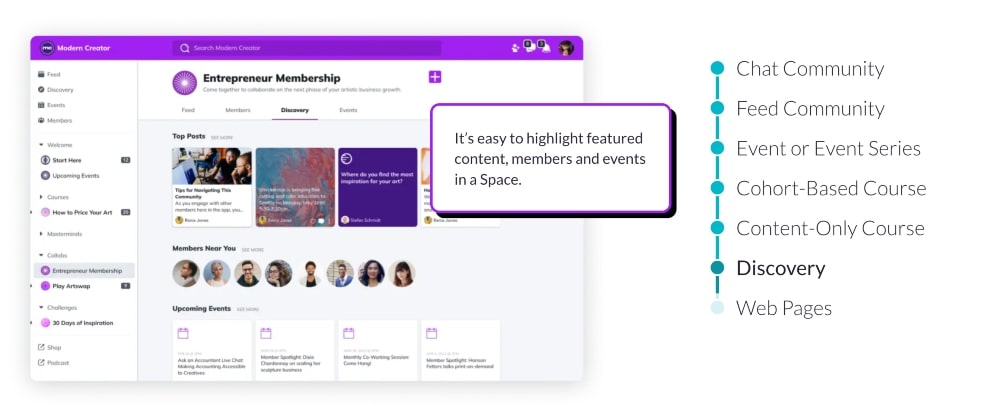
Our Opinion
With Mighty Network’s powerful community-building features, this is the best online course platform for you if you want to prioritize running a free or paid community.
If you want to maximize the customizability of your courses while also running a community, Kajabi is also a great option.
Pricing
All Mighty Networks plans come with a free 14-day trial.
- Courses Plan: Starting at $99/month
- Business Plan: Starting at $179/month for more white-labeling and customization
- Path-to-Pro Plan: Starting at $360/month for additional branding and a dedicated team
- Mighty Pro Plan: Custom pricing
6. Kartra
- Best for: Course creators who need advanced business tools like email marketing automation and funnel building integrated into their platform
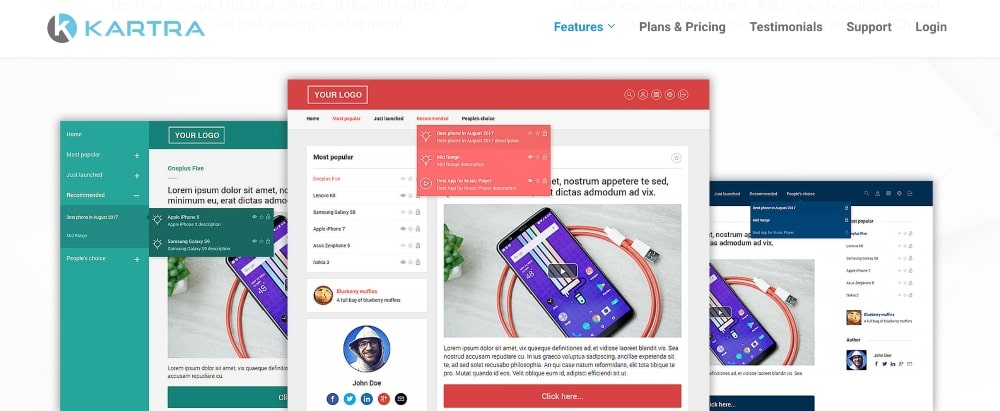
Kartra is an all-in-one marketing platform that offers a comprehensive suite of tools for creating and selling online courses, as well as managing various aspects of an online business.
In addition to course creation and delivery, Kartra provides advanced features such as email marketing automation, sales funnels, and membership site capabilities.
Key Features
- Course creation and hosting
- Email marketing and automation
- Sales funnels and checkout pages
- Membership site capabilities
- Affiliate management
- Analytics and reporting
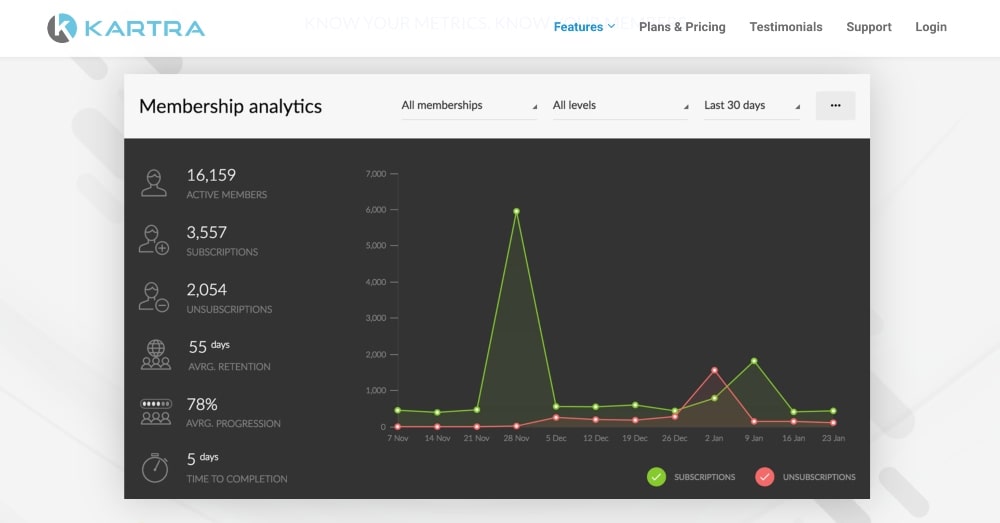
Our Opinion
Kartra is very similar in features to Kajabi and it’s a great choice for a comprehensive, all-in-one online course platform.
In fact, we were evaluating it alongside Kajabi and ultimately settled on Kajabi the course dashboard design is a little more customizable.
There is a steeper learning curve for beginners, so this is a better choice for experienced course creators or those who need a wide range of features. It’s also one of the more expensive online course platforms on this list.
Pricing
- Starter Plan: Starting at $119/month for up to 2,500 contacts
- Silver Plan: Starting at $229/month for up to 12,000 contacts
- Platinum Plan: Starting at $549/month for up to 25,000 contacts
7. LearnWorlds
- Best for: Educators looking to create interactive and socially-rich learning experiences
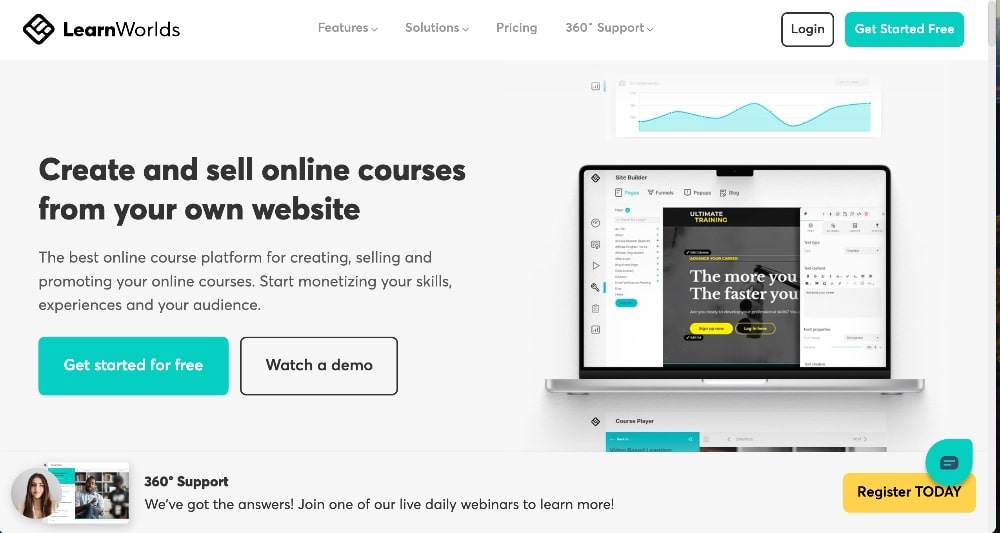
LearnWorlds is a cloud-based online course platform that focuses on creating interactive and socially-rich learning experiences.
It offers a range of tools for building engaging courses, including multimedia support, gamification features, and social learning capabilities.
Key Features
LearnWorlds comes with unlimited courses on all plans.
- Course creation and hosting
- Interactive multimedia content (videos, quizzes, simulations)
- Gamification features (badges, leaderboards)
- Social learning tools (discussions, groups)
- Customizable branding and website
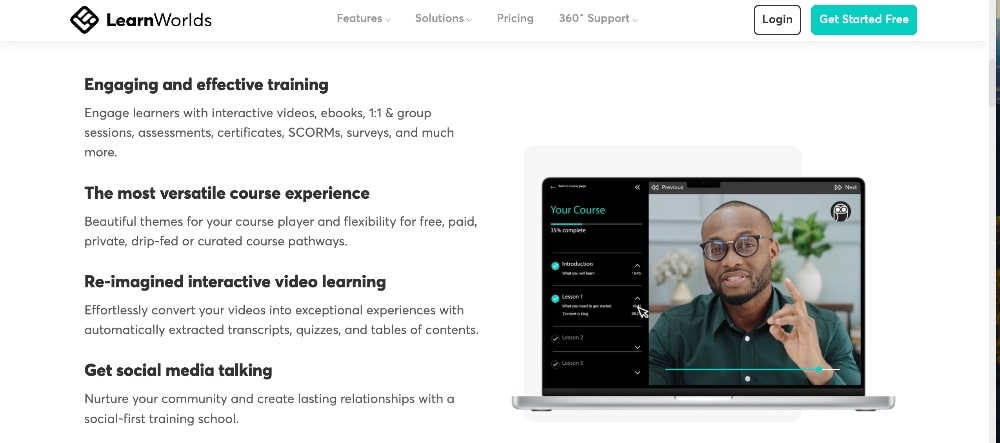
Our Opinion
LearnWorlds is a newer online course platform on the market. With its emphasis on interactive and social learning, it’s a great and affordable option for those who want to facilitate more engagement with their students.
Pricing
- Starter Plan: Starting at $24/month with $5 transaction fees
- Pro Trainer Plan: Starting at $79/month
- Learning Center Plan: Starting at $249/month
8. Udemy
- Best for: Content creators looking to tap into a large audience without needing their own website or marketing channels
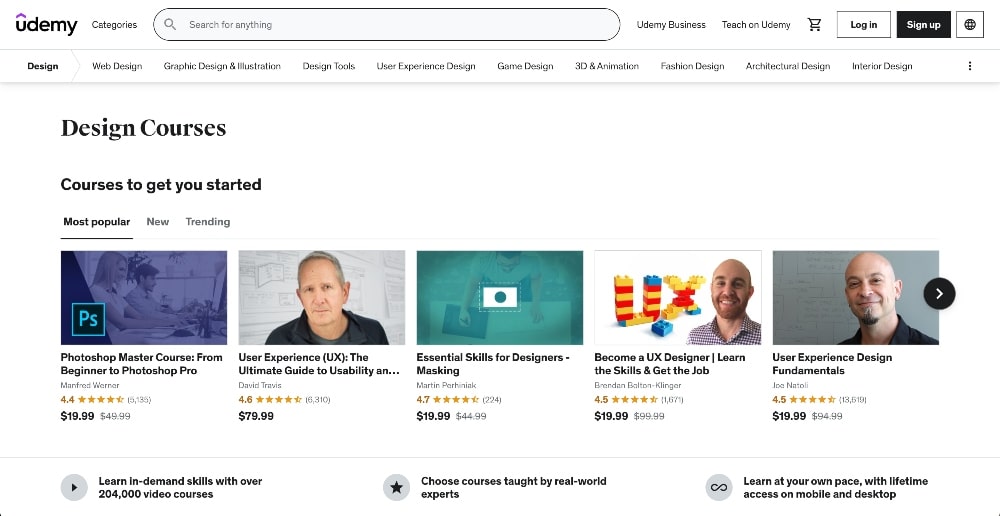
Udemy is a popular online course marketplace that allows creators to upload and sell their courses to a vast global audience.
While Udemy provides a platform for hosting and selling courses, creators have limited control over branding and customization.
However, Udemy’s extensive marketing reach and established user base can be advantageous for those seeking exposure and potential students.
Udemy is one of the best online course platforms for those who don’t want to start a blog or website or drive traffic to their courses.
The biggest downside is that this online course platform is very competitive and the market prices for courses are very low (average $12.99 compared to selling courses for $100+ on non-marketplace platforms).
Key Features
- Course creation and hosting
- Access to Udemy’s global student marketplace
- Instructor revenue sharing model
- Course promotion and marketing tools
- Student engagement features (Q&A, discussions)
- Mobile app
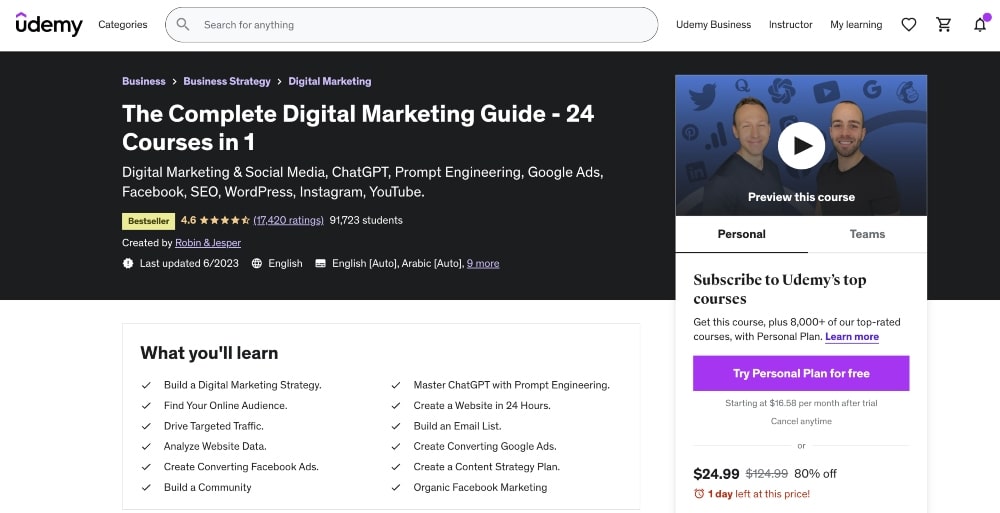
Our Opinion
Online learning platforms like Udemy and Skillshare provide you with access to huge audiences and traffic, but it comes at a price (a very low price for your course, in fact).
This means that you don’t have to create a separate website or market your course in any way, but you are very limited to the course topics, branding, promotion, and more.
I’ve had experience selling on both Udemy and Skillshare, but I think selling on other course platforms is better for most online course creators.
Pricing
While it’s free to create a course on Udemy, they do take a share of your course sales that generally ranges from 37-50%, depending on your pricing and marketing efforts.
9. Skillshare
- Best for: Creators looking to teach in a community-driven environment where courses are often shorter and more project-based
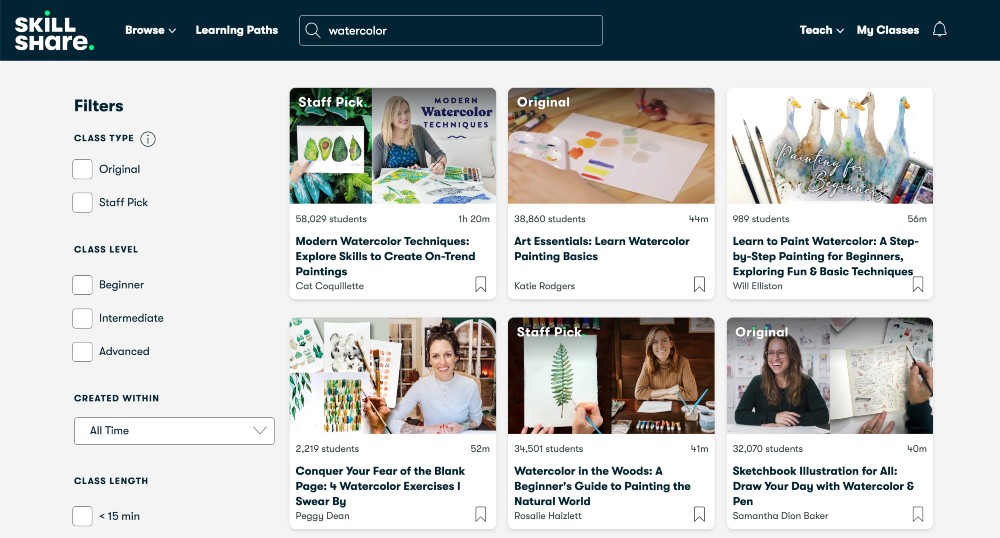
Skillshare is an online learning community focused on creative and entrepreneurial skills. It provides a platform for creators to develop and share project-based courses, often shorter in duration than traditional online courses.
This is the best online course platform if you’re looking for a marketplace option.
Skillshare’s community-driven approach encourages engagement and collaboration among instructors and students.
One standout feature of Skillshare is that all online courses must include a student project that the student can upload to get feedback from the teacher. This encourages student and teacher engagement and improves student performance.
With Skillshare, you also can’t set prices on your course. Anyone that pays for a Skillshare subscription can watch all the courses across the entire course platform and teachers are paid out based on minutes watched.
Key Features
- Course creation and hosting
- Project-based learning format
- Community-driven engagement (discussions, feedback)
- Instructor revenue-sharing model
- Student progress tracking
- Great customer support to create online courses
- Mobile app

Our Opinion
Skillshare can be a better option than Udemy for some people because it’s less competitive. The course topics that they permit are more limited than Udemy, so you may not be able to sell your course on this platform unless it falls in their list of approved topics.
For example, they don’t allow any health and fitness topics.
P.S. If you choose to sell online courses on a marketplace platform like Skillshare, you can ALSO usually list it on other platforms like Udemy to reach additional audiences.
Pricing
Skillshare is free to create online courses. Instructors earn a portion of the subscription fees based on student engagement and course popularity.
10. Coursera
- Best for: Academically-inclined instructors wanting to create more structured and comprehensive courses, often in collaboration with universities

Coursera is one of the leading online learning platforms that partners with universities and organizations to offer a wide range of courses, specializations, and degree programs.
It is well-suited for instructors seeking to create more structured and comprehensive courses, often in collaboration with academic institutions.
Key Features
- Course creation and hosting
- Collaboration with universities and organizations
- Structured course formats (lectures, assignments, quizzes)
- Peer-reviewed assignments and grading
- Certificates and credentials
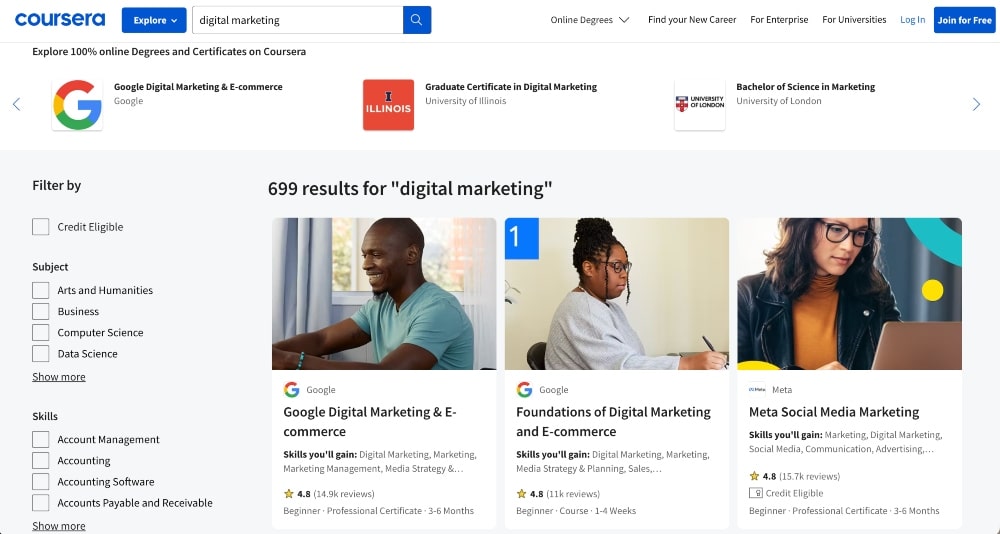
Our Opinion
Because of the focus on partnerships with universities and institutions, Coursera is only going to be one of the best online course platforms for people with connections and affiliations to accredited institutions.
There is also a very strict course approval process for Coursera.
Pricing
Coursera operates on a revenue-sharing model, where instructors and partner institutions receive a portion of the course fees.
11. LinkedIn Learning
- Best for: Professionals creating courses in business, technology, and creative content areas, leveraging LinkedIn’s extensive professional network

LinkedIn Learning is a professional development platform owned by LinkedIn. It offers a vast library of courses in various fields, including business, technology, and creative skills.
LinkedIn Learning is an excellent choice for professionals seeking to create courses that leverage LinkedIn’s extensive professional network.
Key Features
- Course creation and hosting
- Access to LinkedIn’s professional network
- Structured course formats (video tutorials, quizzes, exercises)
- Certificates and credentials
- Integration with LinkedIn profiles

Our Opinion
LinkedIn Learning has a stricter approval process and is better suited for professionals who want integration with LinkedIn profiles and networking capabilities.
This online course platform is ideal for those in the business space who want to reach other business professionals or a corporate audience.
Pricing
LinkedIn Learning operates on a revenue-sharing model, where instructors receive a portion of the subscription fees based on course engagement and popularity.
12. Xperiencify
- Best for: Creators who want to gamify their courses to increase student engagement and completion rates
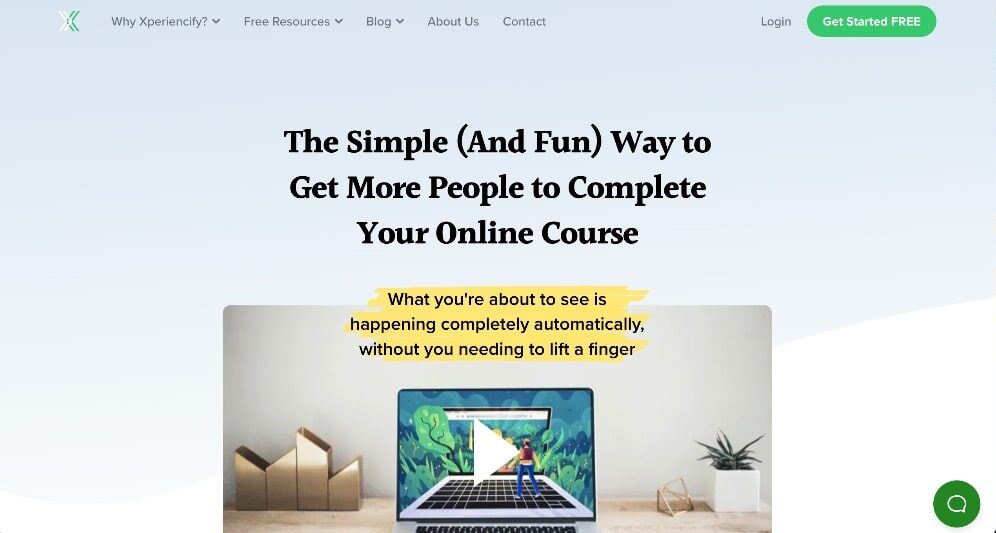
Xperiencify is an online course platform that specializes in gamification, offering a range of tools and features to make learning more engaging and interactive.
It allows creators to incorporate game-like elements, such as badges, leaderboards, and challenges, into their courses to increase student motivation and completion rates.
Key Features
- Course creation and hosting
- Gamification tools (badges, leaderboards, challenges)
- Interactive multimedia content (videos, quizzes, simulations)
- Social learning tools (discussions, groups)
- Customizable branding and website

Our Opinion
Xperiencify is one of the best online course platforms for gamification, which is proven to increase student progress and performance in most cases.
If you want to encourage student engagement and maximize results, this is probably the choice for you.
Pricing
- Starter Plan: Starting at $99/month
- Growth Plan: Starting at $199/month
- Enterprise Plan: Custom pricing
Other Learning Management System Solutions
While the platforms mentioned above are primarily focused on course creation and delivery, there are also several learning management systems (LMS) that offer robust course creation capabilities.
These solutions are often more suitable for organizations, educational institutions, or businesses with specific e-learning requirements.
13. LearnDash
- Best for: WordPress users looking to transform their website into a powerful learning management system with extensive features and flexibility
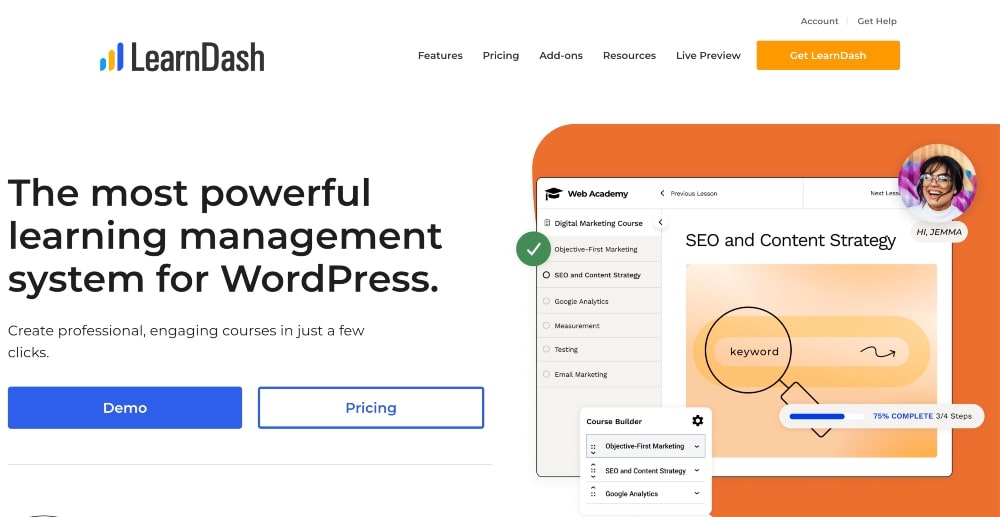
LearnDash is a popular WordPress LMS plugin that allows users to create and deliver online courses directly from their WordPress website.
It offers a wide range of features and customization options, making it a versatile solution for various e-learning projects.
Pricing: Basic plan starts at $159/year for 1 site.
14. iSpring Learn
- Best for: Corporate training, offering a user-friendly interface and comprehensive tools for creating detailed courses that include quizzes, simulations, and detailed analytics
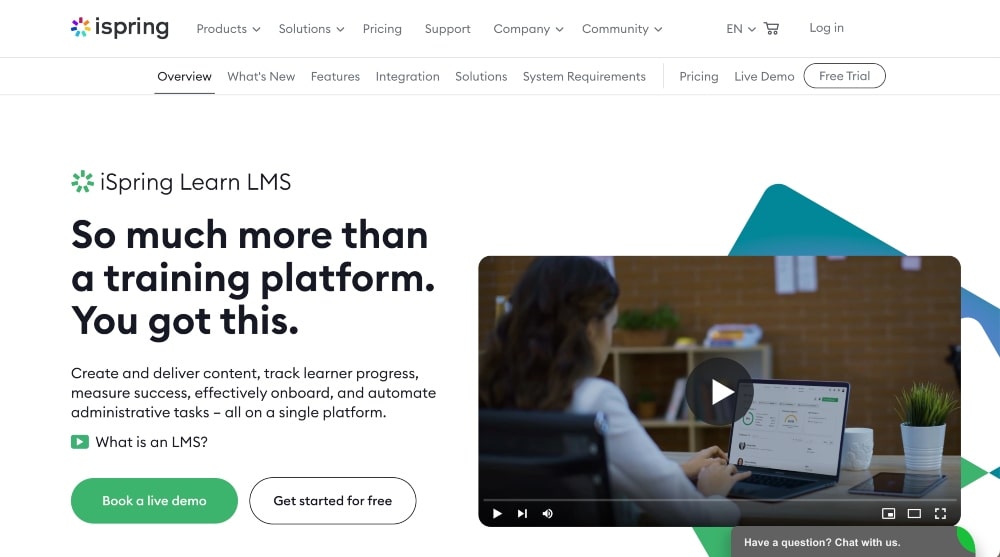
iSpring Learn is a robust LMS geared towards corporate training, enabling businesses to create, deploy, and manage training materials effectively.
The platform is known for its ease of use and rich set of features that facilitate the creation of interactive online courses that can include quizzes, dialog simulations, and rich media.
Pricing: Starts at $3.66 per user/month for the basic plan, with flexible pricing for larger teams or enterprise solutions.
15. LifterLMS
- Best for: Educators and entrepreneurs who prefer a WordPress-based solution that supports a wide range of add-ons to extend functionality, making it versatile for various e-learning projects
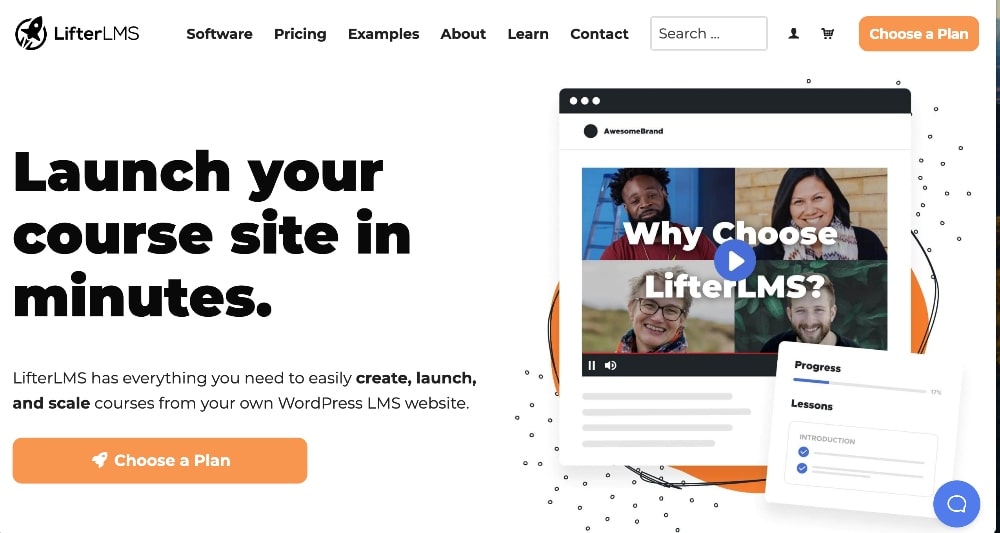
LifterLMS is a flexible, open-source learning management system designed to integrate seamlessly with WordPress.
It is ideal for educators, entrepreneurs, and small to medium-sized businesses looking to create, sell, and protect engaging online courses and training programs directly from their WordPress websites.
Pricing: Core plugin is free; individual add-ons start at $120/year, or bundles available starting at $360/year.
16. AccessAlly
- Best for: Creators and businesses wanting a robust LMS with strong CRM integrations, particularly useful for automating marketing and sales within the learning platform
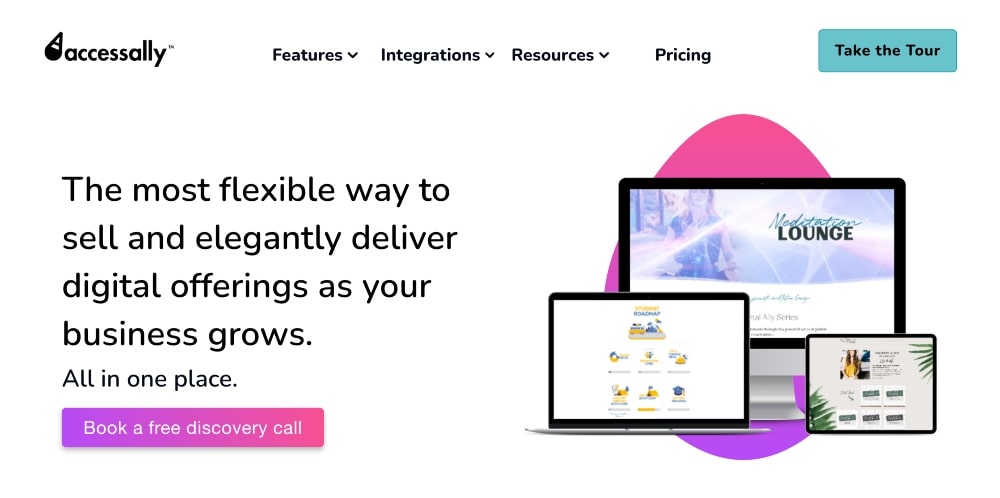
AccessAlly is a powerful LMS that focuses on providing robust customer relationship management (CRM) integrations and automation capabilities.
It is well-suited for businesses and creators who want to streamline their marketing and sales processes within their learning platform.
While this platform is very powerful and customizable, it also has a pretty big learning curve. We tried it out in the past and ultimately decided it wasn’t the right tool to sell online courses for us.
Pricing: Essential plan starts at $99/month
Tips for Creating a Successful Online Course
Online course creation requires careful planning and execution. Here are some tips to help you develop a high-quality, successful course that resonates with your audience:
1. Identify Your Target Audience
Before you start creating your course, it’s essential to understand your target audience’s needs, interests, and learning preferences.
Conduct market research, analyze your existing audience (if any), and define your ideal student persona. This will help you tailor your course content, structure, and delivery to meet their specific requirements.
2. Choose a Relevant and Valuable Topic
Select a topic that aligns with your expertise and addresses a real need or problem faced by your target audience.
Ensure that your course offers practical value and actionable insights that can help your students achieve their goals or solve their challenges.
3. Outline and Structure Your Course
Develop a comprehensive outline that breaks down your course into logical modules, lessons, and topics. This will help you organize your content effectively and ensure a smooth learning experience for your students.
Consider incorporating various formats, such as videos, quizzes, assignments, and downloadable resources, to cater to different learning styles.
4. Create Engaging and High-Quality Content
Invest time and effort into creating high-quality content that is informative, engaging, and visually appealing.
Use clear explanations, real-world examples, and multimedia elements to enhance the learning experience.
Make sure that your content is also up-to-date and accurate.
5. Promote and Market Your Course
Once your course is ready, develop a comprehensive marketing strategy to promote it to your target audience.
Leverage social media platforms, email marketing, influencer collaborations, and other relevant channels to reach potential students.
Consider offering discounts, free previews, or other incentives to attract initial enrollments.
6. Encourage Student Engagement and Community Building
Foster a sense of community and engagement within your course by incorporating interactive elements such as discussion forums, live Q&A sessions, or student projects.
Encourage students to share their experiences, ask questions, and collaborate with one another, as this can enhance the learning experience and increase course completion rates.
7. Continuously Improve and Update Your Course
Regularly gather feedback from your students and analyze course performance metrics to identify areas for improvement. Be open to making updates and revisions to your course content, structure, or delivery methods based on student feedback and evolving industry trends.
By following these tips, you can create a high-quality online course that provides value to your students, establishes you as an authority in your field, and potentially generates a sustainable revenue stream.
FAQs About Course Creation Platforms
Conclusion
Choosing the best online course platform for your needs is going to be key for your launch and subsequent success.
There are a lot of options, so here is another quick summary of our top pick for online course platforms:
- Best for simplicity and just starting out: Teachable or Podia
- Best for additional marketing tools: Kajabi or Kartra
- Best for online communities: Mighty Networks
- Best course marketplaces: Skillshare and Udemy
- Best for gamification: LearnWorlds or Xperiencify
- Best for LMS platforms: LearnDash or iSpring Learn
Consider your specific needs, the features you value most, and the level of investment you’re prepared to make.
Remember, the success of an online course not only depends on great content but also on how effectively it’s delivered and managed.
Take advantage of free trials and demos, engage with user communities, and continuously gather feedback to refine your courses.
With the right platform, you can create impactful learning experiences that resonate with your audience and contribute to their educational journey.